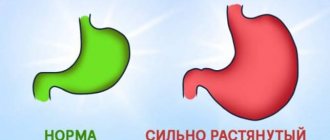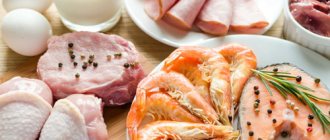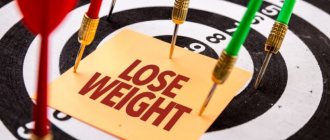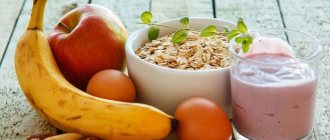Eating less doesn't mean starving
Eating less does not mean not eating at all. Going hungry is almost always a guarantee of eating a lot more in the near future. After several days, a breakdown occurs, which is scientifically called “post-starvation hyperphagia.” Hunger is the main reason why people lack willpower and why they quit dieting.
The body does not like change. It strives to maintain homeostasis or constancy of the internal environment. When you go on a starvation diet, your body turns on your hunger at full capacity and makes you sleepy and weak in order to save energy and replenish losses. You cannot control this process because it is controlled by hormones.
About fifteen hormones are responsible for hunger, the main ones being leptin, ghrelin and neuropeptide Y. They are secreted in different parts of the body, but all affect the brain.
Leptin is produced by fat cells. It tells your brain how much fat (stored energy) you have in your body, as well as how many calories you are taking in. When you are on a fasting diet, leptin levels drop and satiety signals do not reach the brain. In response to this, the brain “turns on” the feeling of hunger in order to escape death from starvation (,). When you eat a lot of calories, enough leptin is produced and it reduces hunger. In addition to hunger, leptin also affects overall metabolism by reducing the production of thyroid hormones ().
Ghrelin is a hunger hormone. It is produced in the stomach when it is empty (). Leptin and ghrelin are in an inverse relationship with each other. When leptin drops on a diet, ghrelin rises. When there is more leptin, there is less ghrelin (). Therefore, a fasting diet is a double blow in terms of hunger.
Neuropeptide Y. One of the tasks of this hormone is to delay the feeling of fullness during meals ().
If you've ever experienced the effects of starvation diets followed by weight loss and weight gain, an imbalance of these hormones most likely played a role (). When we get hungrier, we eat more. When we eat more, we gain the weight back.
Get enough sleep
Ever notice that you tend to eat more when you're tired? We use food, especially carbohydrates, to combat energy slumps. This gives you a quick burst of energy that doesn't last long.
Scientists have proven that fatigue stimulates the human body to produce the hormone ghrelin, which causes hunger. People who sleep 7 to 9 hours each night are 50% less likely to be overweight than people who sleep only 5 hours each night.
Junk food makes you eat more
The quality of food directly affects the number of calories you receive. By “bad” food we mean burgers, desserts, chips, soda, sausages, pizza and the like with a lot of fat, sugar or salt. Unfortunately, the more “bad” food in your diet, the more and more often you want to eat it.
The human brain contains key goals - survival and reproduction. To reward us when we do things that help us survive, the brain has a reward system built into it. In nature, pleasant = useful, and the brain motivates with pleasure. When an action meets these global goals, the brain releases the hormone dopamine, which is responsible for positive reinforcement and motivation to seek repetition of what brought pleasure.
High-calorie food also gives you pleasure and makes you want to eat more of it. When receptors in the mouth and small intestine detect glucose, fructose, fatty acids, and protein amino acids, they send a signal to the brain and dopamine is released in response. And the more glucose and fats in food, the greater the surge of dopamine occurs and the more pleasure we experience from food (, 11,).
This mechanism forced our ancestors to strive for high-calorie (energy-rich) food, which was a good survival mechanism in difficult times. And for this, the brain rewarded with pleasure and motivation to look for it again. Today we still have the survival mechanisms of our ancestors, but we no longer need to look for high-calorie food, it is always nearby and in abundance.
Find the reasons for your appetite
0
Eating less does not mean more calories.
If you recently ate, but the urge to eat something again appears, think about what might have triggered you. The aroma of someone else's dish? Advertising for a product? A group of people eating? Or maybe a memory of a pleasant party where there was a lot of delicious food? If yes, then know: this is the first sign of appetite. This means that eating is not at all necessary. If there was no external stimulation, look into your soul. Often appetite appears when a person cannot cope with his emotions and conditions - loneliness, boredom, anxiety, fatigue. It seems that if you eat a pie, your mental pain will go away. But this is an illusion of relief, which is then replaced by a feeling of guilt. Don't be led by your emotions. Think better about what you can do now to solve the problem or somehow please yourself without resorting to food.
No - sweet drinks
“Liquid” calories are the most invisible. Soda, juices, cocktails based on fruit or coffee, and even seemingly harmless country compote - all this brings a lot of calories due to sugar, but does not make you full.
Appetite is controlled by the brain, and some studies show that it does not “register” calories from liquid sugar in the same way as “solid” ones () and does not include a feeling of fullness as after a regular meal (). So sugary drinks don't fill you up, but they increase your thirst, making you drink more and more. This quietly increases your calorie intake throughout the day, often leading to weight gain.
Good Trick: Changing Utensils
The habit of piling food onto a plate to the top is common to many of us. In fact, people often need much less food than what is in their plate, especially if it is large and spacious. Replace large plates with smaller ones, and you will be surprised to find that you are completely satisfied with the amount of food you put in them, even without the top.
Psychologists believe that dishes with too bright colors (red, orange, yellow) are a kind of stimulant for greater food absorption. Plates of “cold” colors,” on the contrary, do not whet the appetite, but promote a more moderate and calm meal.
Amount of food and amount of calories are not always the same thing
Many people take the phrase “you need to eat less” literally, although it’s not so much about the volume or weight of food, but about how many calories it brings. A big plate of salad is “a lot of food.” Eclair means “little food.” It turns out that you can eat little food in volume, but a lot in calories and vice versa.
There is a concept called energy density. It shows the ratio of calories to the weight of the product. Water is a champion in this regard: it has zero calories at any weight. Fiber also comes close: 2 calories per gram. Fat is the champion on the opposite side, with a whopping 9 calories per gram. A glass of olive oil equals weight maintenance calories for the average woman. To gain the same 1800 calories from vegetables, you need to eat several kilograms. Therefore, very often, after going on a diet, people note that they begin to eat more, but lose weight.
So, thanks to the large amount of water, fiber and the absence of fat, vegetables bring few calories to the body, but are well saturated. Insoluble fiber increases the volume of the food bolus in the stomach, and stomach fullness is one of the important signals of satiety. This helps control body weight and diet: we get fewer calories, but remain full for a long time, do not experience acute hunger and do not lapse into high-calorie foods (,).
All the pros and cons of diets
People who are losing weight are most often divided into two camps - some believe that only a diet will help them achieve the desired figure, while others are convinced that a diet is harmful to their health and body. How is it really?
Pros:
- The weight is really going down. If you give up many unhealthy foods and start counting calories, then weight loss is inevitable.
- The result can be permanently consolidated. Having lost a certain number of kilograms during the diet, women usually consolidate this result for a long time - especially if they abandon their previous taste habits and adhere to proper nutrition.
- You can choose a diet in which you don’t have to starve. Many of them include a fairly large number of foods, albeit low in calories, which allows you to not feel hungry.
Minuses:
- Many diets are quite similar, and if they are followed, a person losing weight does not receive the required number of vitamins and microelements. The result is poor condition of the skin, hair and nails.
- The process may be slow. Only fasting gives quick results, but it deals a big blow to health. A diet, as a rule, shows a significant effect only in the first weeks - then its effect slows down.
- At first, there is a great desire to “break loose”, and thereby cause great harm to the body.
The labels “healthy lifestyle”, “for weight loss”, “weight control” - do not mean anything
Even if a food is marketed as healthy, it may still contain a lot of calories. Healthy lifestyle and everything that claims to be like it may have a better composition (although not always), but the calories don’t disappear anywhere. Here's a comparison of a roll from one of the health food chains and a cheeseburger from McDonald's:
Healthy lifestyle products can lead to unconscious overeating. “Low fat” labels do not mean that the product is low in calories, although that is what we perceive it to be.
Participants in one study were given muesli that was labeled "low-fat." They ended up eating 49% more than those who ate plain, unlabeled muesli, knowing it was a calorie-dense food they'd better not indulge in (). There is also a study that showed that in a supposedly healthy fast food chain, people eat 34% more calories than they thought. While at McDonald's it is +25% (). They considered the exact same food in “healthy” fast food to be lower in calories. Moreover, “healthy” fast food customers tended to reward themselves for their healthy lifestyle by ordering extra chips or cookies.
This tendency to unconsciously overeat foods perceived to be healthier is known as the “health halo effect,” which is well known to marketers who increase sales simply by labeling them gluten-free, low-fat, or organic. etc. So choose products based on their ingredients rather than the health promise on the label.
Eat with a small spoon
Try eating from a small plate. A purely psychological trick works here: a modest piece of meat on a large plate seems tiny (even if you supplement it with vegetable salad, there will still be empty spaces), but if you put the same amount on a small saucer, you will get the feeling of a large portion. It is also better to replace cutlery: a large spoon - with a small one, an ordinary fork - with a dessert fork.
By taking small bites of your food, you will protect yourself from overeating. European nutritionists conducted the following experiment: subjects were asked to eat soup with large spoons on one day, and small ones on the other. Then the results were compared. So, in the first case, people could not objectively assess the amount of food eaten and “threw” into themselves more than was required. And in the second, they ate a third less because they became full faster.
Is losing weight expensive? How to get in shape and not go broke
More details
Natural sweets do not become dietary
It is a well-known mistake to consider natural foods to be dietary and low-calorie. There is nothing wrong with natural sweets, but this is not permission to eat them uncontrollably.
Honey. A person gives up sugar, but adds “healthy and natural” honey to his morning porridge, but in three times more quantity. Sugar has 380 calories and honey has 320. Mixed nuts are considered a “healthy snack,” and they are. But if you look at the label, they turn out to be just as high in calories: 100 grams of nuts contain 500 calories. And this is a very compact handful, which is usually not limited to. Muesli bars and loose muesli. Thanks to marketers, high-calorie foods are now called “energy foods.” Who doesn't want energy? “Get your energy for the day” sounds a lot better than “eat half your calories first thing in the morning.” Dried fruits are healthy, but incredibly high in calories. Dates have about 300 calories per 100 grams, which is just a small handful. Fresh fruits contain a lot of water, and it is very difficult to eat a kilogram of apricots, but nothing in the form of dried apricots. Essentially, dried fruits are just candies with a little fiber and vitamins. This comes back to the issue of energy density: small volume, high calories. PP cakes, where all the usual ingredients are replaced with natural ones: instead of buttercream - peanut butter, dates, coconut oil, bananas. Instead of white flour, use any other flour: with bran, gluten-free, almond or buckwheat. It's much healthier than refined sugar and margarine, but the calories are the same.
A natural product does not mean that it is “dietary”. Although that's exactly what it seems like. Therefore, it is important to separate calories from naturalness and benefits. These are different planes.
Dinner can be filling
Many people still have the idea that breakfast gives you energy for the day and should be the most high-calorie breakfast. They say that this is a marketing ploy by manufacturers of cereals or corn flakes from the 40s of the last century. In any case, even the most satisfying breakfast will charge you with energy for a maximum of 3-4 hours. If you move most of your food to the first half of the day, it will be difficult to fight evening hunger. And it will definitely come, because it is impossible to eat enough once and for the whole day, no matter how much you eat.
The “no food after X hours” diet may not suit everyone, because everyone has their own lifestyle, daily routine and activity level. Choosing the frequency of meals and the distribution of foods throughout the day should be realistic and convenient for you. For some, shifting most of your calories to the evening may be more effective for weight loss.
- Firstly, it's a full dinner with the family.
- Secondly, many people work during the day and forget/don’t have time to eat properly, so they tolerate hunger more easily. It’s easier for them to distract themselves from thoughts about food while they’re doing something. In the evening, when work is over and a person is left to his own devices, it is very difficult to refuse food - the refrigerator beckons and nothing distracts from thoughts of hunger. Many people go in circles: the ideal healthy lifestyle in the first half of the day and hungry breakdowns for junk food before bed.
- Thirdly, a sufficient amount of carbohydrates in the last meal helps you fall asleep faster (and there are often problems with falling asleep on a diet due to feelings of hunger).
Psychological attitude
Overeating in most cases has psychological reasons, not physiological ones. If you are determined to take the path of losing weight, then first of all you need to change your way of thinking. The mind may be filled with destructive patterns and negative attitudes that you are not even aware of. Before you start dealing with them, it is important to identify them and understand the root cause. Perhaps someone told you that dieting is a waste of time or that being overweight is a natural feature and cannot be eliminated. You need to realize the absurdity of negative attitudes and replace them with positive ones.
Set a specific goal for which you have decided to lose weight. Imagine what your body will be like after a month of dieting, and what it will be like after six months or a year. It is also advisable to communicate with like-minded people, and not with those who offer donuts, cakes or cookies. Additionally, you should not eat food as a reward for something or to relieve stress.









